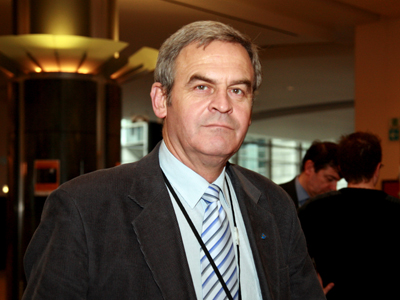 In today's readings, St. Matthew begins his gospel with a deceptively simple statement, "This is how the birth of Jesus Christ came about." What follows deals with an unexpected pregnancy, angels, dreams, a prophecy, and a virgin birth.
In today's readings, St. Matthew begins his gospel with a deceptively simple statement, "This is how the birth of Jesus Christ came about." What follows deals with an unexpected pregnancy, angels, dreams, a prophecy, and a virgin birth.Central to Matthew's account is St. Joseph. Mary is found to be with child. Even though they are betrothed, they are not yet living together. For Mary to be pregnant in that case is bad enough, but Joseph apparently knows of her story of the visitation of the angel Gabriel and the claim that she is with child by the power of the Holy Spirit. "That can't be true, can it?" Joseph must wonder. He has decide. Can he believe her story or should he end the marriage?
Going to sleep on it, he dreams of an angel--was it Gabriel?--telling him, as angels usually do at first, "Do not be afraid!" The angel confirms that his wife, Mary, is with child by the Holy Spirit. He directs Joseph to take Mary into his home and to name the the child Jesus.
I don't know about you, but I wouldn't make any of my dreams the basis of a big decision! But I think that this was the kind of dream that is more real than life itself. Another Joseph was a dreamer and his dreams ultimately saved Egypt from famine and, in doing so, saved the Jewish people, setting the stage for their Exodus. Now this Joseph, husband of Mary, dreams of the salvation of his people. He takes Mary into his home and names their son Jesus.
St. Matthew places the story of Mary and Joseph into the larger picture. He quotes from our first reading from Isaiah, "Behold a virgin shall conceive and bear a son, and they shall name him Emmanuel." As the Church reflected on they stories of Christ's birth that ultimately were written down in St. Matthew's and St. Luke's gospels, they saw this as the fulfillment of Isaiah's words. He had gone to King Ahaz to tell the king to ask for a sign that the attack against Jerusalem by the kings of Israel and Damascus would fail. King Ahaz feigns humility and refuses to tempt the Lord. So Isaiah tells him that the Lord himself has decided what the sign will be, "the virgin shall conceive and bear a son, and shall name him Emmanuel."
There is some dispute over whether the Hebrew word here translated virgin means "virgin" or "young woman". The Greek word used in the New Testament does mean virgin. It shows us what the early Church thought this story of Mary and Joseph meant. It helps us understand why Joseph was so concerned. Mary was as virgin when she was found to be with child. She and Joseph had not had relations. That's why Joseph thought he should divorce her quietly and spare her any additional shame. That's also why it took an angelic dream to sort things out!
The Church talks much about Mary's fiat, her "yes" to the angel's message to her--and rightly so. But let's take a moment to think of Joseph's "yes" to the angel's message to him, for it is just as important. In the midst of a difficult, embarrassing and confusing situation, Joseph listened to what God was saying to him. St. Matthew tells us that when he awoke, he did as the angel of the Lord had commanded. We need to wake-up!
As a result of this obedience, Jesus was born into a family with a father and a mother. Think of it! God entrusted his only-begotten Son to a human father and mother in Joseph and Mary. Joseph took the child and raised him as his own. He was the example to God of what it meant to be a man!
St. Joseph is the patron saint of the universal Church, all of us! Let us learn from him as Christ did what it means to be human. Even when it is confusing or difficult or embarrassing, let us say yes to God as Joseph did. That simple "yes" of faith is why we call him Saint Joseph. When we receive Jesus in the Eucharist today, let us, as Joseph did, wake-up and say "yes" to Jesus.






